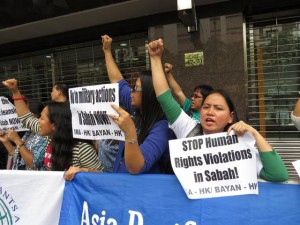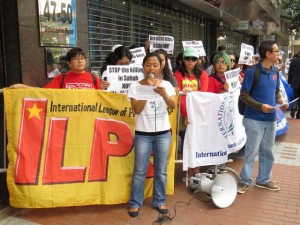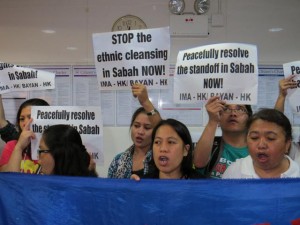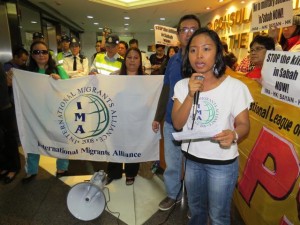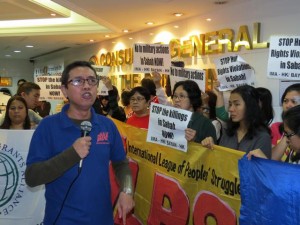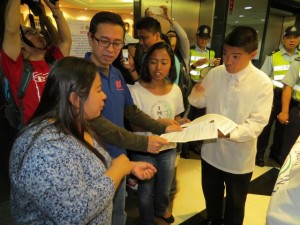
MANILA (Mindanao Examiner / Mar. 13, 2013) – Dozens of Filipino migrant workers held protested in front of the Philippine and Malaysian Consulate General offices in Hong Kong and condemned the continued and massive military assault against a rag-tag army of followers of the Sultanate of Sulu in the oil-rich island of Sabah.
The International Migrants’ Alliance (IMA), an international alliance of 112 grassroots migrant organizations and institutions working for migrant workers, said the Filipino protesters in Hong Kong were joined by their local friends and supporters.
Sabah, or North Borneo as called by the Sultanate of Sulu, is being claimed by the Muslim royal clan based on historical and legal rights, but Malaysia illegally annexed the island, just several hours by boat from the southern Philippine province of Tawi-Tawi.
The Malaysian assault on the group of Sultan Jamalul Kiram headed by his younger brother Raja Muda Agbimuddin in Lahad Datu town had already killed at least 61 people.
“By taking military action to resolve the crisis, many migrants, both documented and undocumented, and refugees have been affected negatively – some have been laid off work, many have been harassed and intimidated by security forces of Malaysia, hundreds have been arrested, detained and deported back to the Philippines. However, not only Filipino migrants are being attacked but Indonesians as well,” the IMA said in a statement sent to the regional newspaper Mindanao Examiner.
The statement, which was also submitted to both representatives of the government consular offices, reads: “We in the International Migrants’ Alliance (IMA) call on both the Philippine and Malaysian governments to immediately cease from any militaristic pursuits to resolve the Sabah standoff and instead sit down for a dialogue to peacefully and justly settle the crisis.
The crisis has seen 61 people killed and several others injured. It has also caused an escalation in cases of arrest, detention and deportation of many undocumented Filipinos in Malaysia, particularly those in Sabah.
According to news reports, more than 300 Filipinos have already been deported since the start of the standoff. Not only layoffs of Filipinos have been reported but also allegations of abuse and ostracism of Filipino deportees by Malaysian authorities. Some families in the occupied village have also been displaced.
Early in February this year, a group of 235 Moro Filipinos calling themselves the “Royal Security Forces of the Sultanate of Sulu and North Borneo”, later to be known as the Royal Army of Sulu, sailed from Tawi Tawi to Sabah and occupied the village of Tanduo in Lahad Datu. The group led by Jamalul Kiram III lays territorial claim of Sabah, a contested land between the Philippines and Malaysia.
The IMA strongly criticizes the Philippine government for expressing “almost complete surrender” on the Sabah issue and thereby putting Filipinos’ lives in grave danger. Instead of heeding to Kiram’s call for a dialogue, President Benigno Aquino III chose to demand Kiram and his group to surrender to the Malaysian forces. Such a foolish and rash statement is a license given by Aquino himself to the Malaysian government to attack and kill the Royal Army of Sulu.
President Aquino is washing his hands off the Sabah issue with innocuous and vapid statements to the media.
One cannot help but wonder how and why the Philippine government is playing apologist for the Malaysian government. Why is Aquino parroting the lines pronounced by his counterpart Prime Minister Najib Rajak? Is it because Malaysia has played brokered the peace talks between the Philippine government and the Moro Islamic Liberation Front (MILF)? Isn’t this the very essence of the conspiracy President Aquino was mouthing to the press? The conspiracy may actually be between the Malaysian and Philippine governments against the Sultanate of Sulu and the Tausug?
The Malaysian government, on the other hand, deserves no escape from the criticisms as it has also heavy-handedly committed brute force and resorted to violence in addressing the standoff while blanketly ignoring the historical dimension of the Sabah issue. What’s with the many reports of many Moro Filipinos, particularly Tausugs (which Sultan Kiram and his people are of ethnic descent), being allegedly rounded up and terrorized by Malaysian security forces? Isn’t this tantamount to ethnic cleansing?
The Sabah standoff is a political issue that needs to be settled immediately yet peacefully, and it is only imperative for the ASEAN, or the Association of Southeast Asian Nations, to broker this resolution. Brunei, being the head of the ASEAN this year, is in a position to assist in the peaceful resolution of the standoff. It may also help that it was the sultan of Brunei who gave the Sabah islands as a gift to the Sultan of Sulu in 1878.
The silence from the ASEAN leaders needs to be broken as the violence continues to escalate in Sabah. What’s the meaning and effect of the Treaty of Amity and Cooperation of 1976 (which states the renunciation of threat or the use of force) and the Asean Charter of 2008 (which provides the rules or peaceful resolution of disputes among its members) if they are not be enforced? What teeth and powers that the ASEAN has if all its leaders aim to have an ASEAN community by 2015?
The military atrocity in Sabah needs to stop. The bloodshed and the human rights violations have got to end. Resolve the Sabah standoff now.
If both governments are serious in their commitment to upholding human rights, justice and peace, they should have immediately sat on the negotiation table together with Kiram’s group and other involved sections to peacefully and scrupulously provide a solution the territorial and sovereignty debate on Sabah. Moreover, the ASEAN and its leaders need to involve themselves in facilitating this.
It is ironic that the US government remains silent on the escalating military atrocities in Sabah. We must remind President Barrack Obama that his government is a party to the disputed island during the early period of colonialism in the Philippines.
An international humanitarian mission is also in order as many cases of violations and displacement in Sabah have been documented. More relief and services need to be extended by both governments to those affected by these unfortunate events.
If the violations continue and escalate due to the standoff, we call on the United Nations to help in resolving this matter. The UN must act beyond words. We call on all civil society organizations and the international community in pressuring both the Philippine and Malaysian governments in taking immediate actions to finding a peaceful resolution to the Sabah standoff and the human rights and peace aspects of the crisis.”

